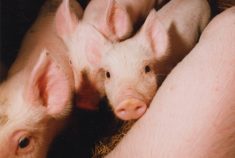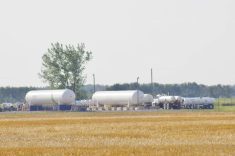The new $5,000 cap on farmland education tax rebates the Manitoba government announced in last week’s budget should be scrapped, farmers meeting here last week said.
A resolution to lobby the government to reverse changes to the program passed at the Keystone Agricultural Producers’ general council meeting April 18.
“If you take a look at what they’re doing, this is the thin edge of the wedge,” said Glenn Young, a District 2 delegate from Cyprus River. “They promised us in the last election they would rebate 100 per cent of the tax and now they’re clawing it back.”
Read Also

Mazergroup’s Bob Mazer dies
Mazergroup’s Bob Mazer, who helped grow his family’s company into a string of farm equipment dealerships and the main dealer for New Holland machinery in Saskatchewan and Manitoba, died July 6 from cancer.
Owners will still be able to apply to get 80 per cent of the education tax on their farmland rebated, but to a maximum of $5,000.
Also out-of-province landowners will no longer be eligible for any of the rebate. Reg Dyck, a District 3 delegate who farms at Starbuck predicts that change will force land rent higher.
“Once they put a cap in what’s to say they don’t change the cap?” he said.
KAP’s standing policy remains that education taxes should be removed from all property, including farmland and buildings.
KAP delegates also passed a resolution calling on the federal government to cost share more than 60 per cent of emergency funding related to flood waters entering Manitoba from outside the province.
The Canadian government paid more than 60 per cent during the 1997 flood, said Glen Franklin, a District 1 delegate from Deloraine.
“We sure don’t see that coming out of this present federal government in any way, shape or form, especially after the 2011 flood when they did squat,” he said. “They haven’t even paid the 60 per cent yet. With that in mind I think we need to have a very firm discussion with our members of Parliament in this province…”
District 1 withdrew a strongly worded resolution demanding that the Manitoba government “stop bullying rural Manitoba for its own political gain.”
Minto farmer Bill Campbell said the resolution underscores the frustration farmers in his area feel over provincial restrictions on hog production, the ban on sewage ejectors and forced municipal amalgamations.
The late spring was top of mind with farmers at the meeting. Colder-than-normal temperatures and deep snow through much of agro-Manitoba is delaying seeding, Chorney said. Seeding was in full swing this time last year, although it was earlier than usual.
“It’s too soon to say this is a crisis, but if it’s like this the first two weeks of May we’re definitely at the point where it will be a challenge to get these crops planted and grown,” he said.
Farmers are also worried about flooding along the Red and Assiniboine rivers because of all the snow in both watersheds, including in Saskatchewan and North Dakota.
“Hopefully we’ll get through this but it all depends on the weather we get and how it thaws,” Chorney said.



















